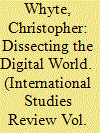| Srl | Item |
| 1 |
ID:
166755


|
|
|
|
|
| Summary/Abstract |
Many international-relations scholars assume that stronger states get their way in world politics. The books reviewed here provide a coherent research program that challenges that notion. By treating asymmetrical international relations as an analytical category distinct from relations attaining among peer states, the authors make theoretical and empirical progress in addressing puzzles about why stronger states do not always prevail. These contributions matter for students of small-state foreign policy, of U.S. foreign policy, and of international hierarchy. This essay describes and reviews the new research program while showing how it could build connections to the literature on hierarchy and international relations.
|
|
|
|
|
|
|
|
|
|
|
|
|
|
|
|
| 2 |
ID:
161745


|
|
|
|
|
| Summary/Abstract |
Though focused on realizing markedly different analytic outcomes, each of the four books under review here approaches the task of balancing the technological ramifications of advancing digital developments against the implications of relevant sociopolitical context with a reasonable degree of success. Taken together, the books present several significant messages not only about prospects for cyber conflict but also about the aims and imperatives of the burgeoning cyberpolitics research program. In particular, these volumes do a great deal to move the discussion on cyberspace and interstate conflict beyond the bounds of traditional IR theories by demonstrating that the use of assumptions about the predigital world can constrain analytic attempts to understand the parameters of political phenomena in the digital age. Applied too strictly, some assumptions can lead to biased conclusions and overstated predictions, which in turn can have serious policy consequences. Moving forward, IR scholars face the serious task of reevaluating basic conceptual precepts and adapting them to produce new and useful models for understanding conflict, violence, and more.
|
|
|
|
|
|
|
|
|
|
|
|
|
|
|
|
| 3 |
ID:
168951


|
|
|
|
|
| Summary/Abstract |
When and how do domestic politics influence a state's nuclear choices? Recent scholarship on nuclear security develops many domestic-political explanations for different nuclear decisions. These explanations are partly the result of two welcome trends: first, scholars have expanded the nuclear timeline, examining state behavior before and after nuclear proliferation; and second, scholars have moved beyond blunt distinctions between democracies and autocracies to more fine-grained understandings of domestic constraints. But without linkages between them, new domestic-political findings could be dismissed as a laundry list of factors that do not explain significant variation in nuclear decisions. This review essay assesses recent research on domestic politics and nuclear security, and develops a framework that illuminates when and how domestic-political mechanisms are likely to affect nuclear choices. In contrast to most previous domestic arguments, many of the newer domestic-political mechanisms posited in the literature are in some way top-down; that is, they show leaders deliberately maintaining or loosening control over nuclear choices. Two dimensions govern the extent and nature of domestic-political influence on nuclear choices: the degree of threat uncertainty and the costs and benefits to leaders of expanding the circle of domestic actors involved in a nuclear decision. The framework developed in this review essay helps make sense of several cases explored in the recent nuclear security literature. It also has implications for understanding when and how domestic-political arguments might diverge from the predictions of security-based analyses.
|
|
|
|
|
|
|
|
|
|
|
|
|
|
|
|
| 4 |
ID:
157700


|
|
|
|
|
| Summary/Abstract |
RONALD R. KREBS reviews Richard Haass’ new book, A World in Disarray, which makes the case for U.S. leadership in constructing a new legitimate world order. He argues that Haass’ vision is driven by nostalgia for a world that never existed and that it warrants caution: world-shaping ambitions have proven extremely costly.
|
|
|
|
|
|
|
|
|
|
|
|
|
|
|
|
| 5 |
ID:
148149


|
|
|
|
|
| Summary/Abstract |
MEENA BOSE reviews Jon Meacham’s biography Destiny and Power: The American Odyssey of George Herbert Walker Bush. She finds that Bush’s diplomatic expertise and collegial leadership style raise important questions about the role of the presidency in the American political system.
|
|
|
|
|
|
|
|
|
|
|
|
|
|
|
|